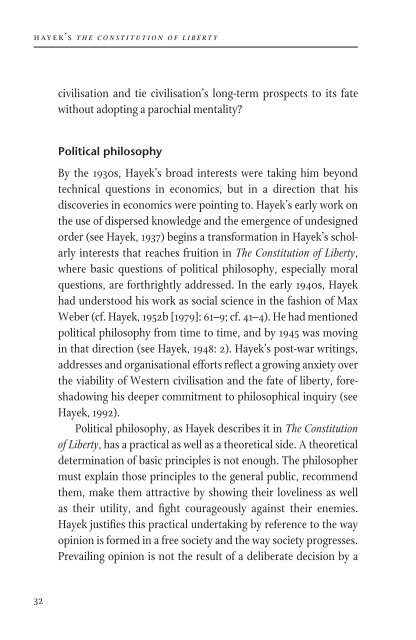Hayek's The Constitution of Liberty - Institute of Economic Affairs
Hayek's The Constitution of Liberty - Institute of Economic Affairs
Hayek's The Constitution of Liberty - Institute of Economic Affairs
Create successful ePaper yourself
Turn your PDF publications into a flip-book with our unique Google optimized e-Paper software.
h ay e k ’ s t h e c o n s t i t u t i o n o f l i b e r t y<br />
h ay e k ’ s i n t r o d u c t i o n<br />
civilisation and tie civilisation’s long-term prospects to its fate<br />
without adopting a parochial mentality?<br />
Political philosophy<br />
By the 1930s, Hayek’s broad interests were taking him beyond<br />
technical questions in economics, but in a direction that his<br />
discoveries in economics were pointing to. Hayek’s early work on<br />
the use <strong>of</strong> dispersed knowledge and the emergence <strong>of</strong> undesigned<br />
order (see Hayek, 1937) begins a transformation in Hayek’s scholarly<br />
interests that reaches fruition in <strong>The</strong> <strong>Constitution</strong> <strong>of</strong> <strong>Liberty</strong>,<br />
where basic questions <strong>of</strong> political philosophy, especially moral<br />
questions, are forthrightly addressed. In the early 1940s, Hayek<br />
had understood his work as social science in the fashion <strong>of</strong> Max<br />
Weber (cf. Hayek, 1952b [1979]: 61–9; cf. 41–4). He had mentioned<br />
political philosophy from time to time, and by 1945 was moving<br />
in that direction (see Hayek, 1948: 2). Hayek’s post-war writings,<br />
addresses and organisational efforts reflect a growing anxiety over<br />
the viability <strong>of</strong> Western civilisation and the fate <strong>of</strong> liberty, foreshadowing<br />
his deeper commitment to philosophical inquiry (see<br />
Hayek, 1992).<br />
Political philosophy, as Hayek describes it in <strong>The</strong> <strong>Constitution</strong><br />
<strong>of</strong> <strong>Liberty</strong>, has a practical as well as a theoretical side. A theoretical<br />
determination <strong>of</strong> basic principles is not enough. <strong>The</strong> philosopher<br />
must explain those principles to the general public, recommend<br />
them, make them attractive by showing their loveliness as well<br />
as their utility, and fight courageously against their enemies.<br />
Hayek justifies this practical undertaking by reference to the way<br />
opinion is formed in a free society and the way society progresses.<br />
Prevailing opinion is not the result <strong>of</strong> a deliberate decision by a<br />
majority or by an intellectual elite; instead, it grows out <strong>of</strong> a spontaneous<br />
and continuous process that elevates a minority view to<br />
a dominant position and then supplants it through the rise <strong>of</strong><br />
another minority view (109–10). Discussion is essential finally to<br />
the emergence <strong>of</strong> the dominant view, but first people must learn<br />
about the alternatives by seeing individuals act them out.<br />
But how do new ideas originate? <strong>The</strong> practical politician<br />
is necessarily ‘unoriginal’ in his beliefs. His task is to find the<br />
opinions held by the majority, and he moves within this framework.<br />
New ideas come from those few who pr<strong>of</strong>essionally handle<br />
abstract ideas, and eventually their ideas shape majority opinion.<br />
Here Hayek quotes approvingly some well-known passages from<br />
J. S. Mill and J. M. Keynes to the effect that ‘speculative philosophy’<br />
(Mill) or ‘the ideas <strong>of</strong> economists and political philosophers’<br />
(Keynes) are, in the long run, far more powerful than interests in<br />
shaping thought and action. When judged only by his direct influence<br />
on current affairs, ‘the influence <strong>of</strong> the political philosopher<br />
may be negligible,’ but ‘when his ideas have become common<br />
property, through the work <strong>of</strong> historians and publicists, teachers<br />
and writers, and intellectuals generally, they effectively guide<br />
developments’ (112–13).<br />
Hayek greatly elevates the philosopher’s historical role by<br />
insisting that evolution is governed, in the long run, by ‘ideas and<br />
therefore the men who give currency to new ideas.’ He assigns<br />
importance not only to the innovators, but also to those thinkers<br />
who, along the way, provide ‘a set <strong>of</strong> coherent conceptions’ to<br />
govern the evolutionary process. Hayek’s own objectives have to<br />
be understood in this light. He does not claim to be a great innovator,<br />
but rather one who restates old truths coherently. <strong>The</strong><br />
political philosopher must address the question <strong>of</strong> what ought to<br />
32<br />
33












